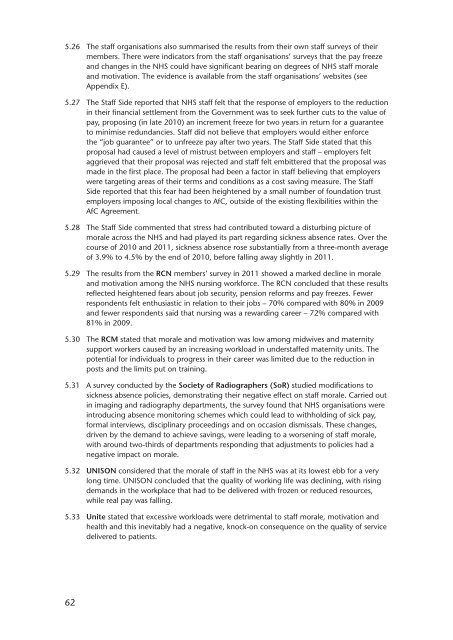NHS pay review body: twenty-sixth report 2012 - Official Documents
NHS pay review body: twenty-sixth report 2012 - Official Documents
NHS pay review body: twenty-sixth report 2012 - Official Documents
Create successful ePaper yourself
Turn your PDF publications into a flip-book with our unique Google optimized e-Paper software.
5.26 The staff organisations also summarised the results from their own staff surveys of their<br />
members. There were indicators from the staff organisations’ surveys that the <strong>pay</strong> freeze<br />
and changes in the <strong>NHS</strong> could have significant bearing on degrees of <strong>NHS</strong> staff morale<br />
and motivation. The evidence is available from the staff organisations’ websites (see<br />
Appendix E).<br />
5.27 The Staff Side <strong>report</strong>ed that <strong>NHS</strong> staff felt that the response of employers to the reduction<br />
in their financial settlement from the Government was to seek further cuts to the value of<br />
<strong>pay</strong>, proposing (in late 2010) an increment freeze for two years in return for a guarantee<br />
to minimise redundancies. Staff did not believe that employers would either enforce<br />
the “job guarantee” or to unfreeze <strong>pay</strong> after two years. The Staff Side stated that this<br />
proposal had caused a level of mistrust between employers and staff – employers felt<br />
aggrieved that their proposal was rejected and staff felt embittered that the proposal was<br />
made in the first place. The proposal had been a factor in staff believing that employers<br />
were targeting areas of their terms and conditions as a cost saving measure. The Staff<br />
Side <strong>report</strong>ed that this fear had been heightened by a small number of foundation trust<br />
employers imposing local changes to AfC, outside of the existing flexibilities within the<br />
AfC Agreement.<br />
5.28 The Staff Side commented that stress had contributed toward a disturbing picture of<br />
morale across the <strong>NHS</strong> and had played its part regarding sickness absence rates. Over the<br />
course of 2010 and 2011, sickness absence rose substantially from a three-month average<br />
of 3.9% to 4.5% by the end of 2010, before falling away slightly in 2011.<br />
5.29 The results from the RCN members’ survey in 2011 showed a marked decline in morale<br />
and motivation among the <strong>NHS</strong> nursing workforce. The RCN concluded that these results<br />
reflected heightened fears about job security, pension reforms and <strong>pay</strong> freezes. Fewer<br />
respondents felt enthusiastic in relation to their jobs – 70% compared with 80% in 2009<br />
and fewer respondents said that nursing was a rewarding career – 72% compared with<br />
81% in 2009.<br />
5.30 The RCM stated that morale and motivation was low among midwives and maternity<br />
support workers caused by an increasing workload in understaffed maternity units. The<br />
potential for individuals to progress in their career was limited due to the reduction in<br />
posts and the limits put on training.<br />
5.31 A survey conducted by the Society of Radiographers (SoR) studied modifications to<br />
sickness absence policies, demonstrating their negative effect on staff morale. Carried out<br />
in imaging and radiography departments, the survey found that <strong>NHS</strong> organisations were<br />
introducing absence monitoring schemes which could lead to withholding of sick <strong>pay</strong>,<br />
formal interviews, disciplinary proceedings and on occasion dismissals. These changes,<br />
driven by the demand to achieve savings, were leading to a worsening of staff morale,<br />
with around two-thirds of departments responding that adjustments to policies had a<br />
negative impact on morale.<br />
5.32 UNISON considered that the morale of staff in the <strong>NHS</strong> was at its lowest ebb for a very<br />
long time. UNISON concluded that the quality of working life was declining, with rising<br />
demands in the workplace that had to be delivered with frozen or reduced resources,<br />
while real <strong>pay</strong> was falling.<br />
Unite<br />
5.33 stated that excessive workloads were detrimental to staff morale, motivation and<br />
health and this inevitably had a negative, knock-on consequence on the quality of service<br />
delivered to patients.<br />
62
















